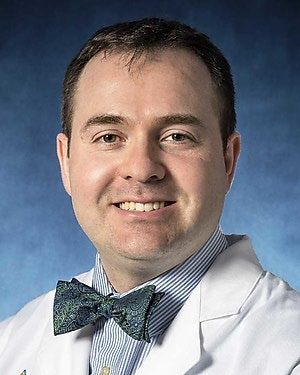Research Lab Results
-
Christopher A. Ross Lab
Dr. Ross and his research team have focused on Huntington's disease and Parkinson's disease, and now are using insights from these disorders to approach more complex diseases such as schizophrenia and bipolar disorder. They use biophysical and biochemical techniques, cell models, and transgenic mouse models to understand disease processes, and to provide targets for development of rational therapeutics. These then can provide a basis for developing small molecule interventions, which can be used both as probes to study biology, and if they have favorable drug-like properties, for potential therapeutic development. We have used two strategies for identifying lead compounds. The first is the traditional path of identification of specific molecular targets, such as enzymes like the LRRK2 kinase of Parkinson’s disease. Once structure is known, computational approaches or fragment based lead discovery, in collaboration, can be used. The second is to conduct phenotypic screens using cell models, or in a collaboration, natural products in a yeast model. Once a lead compound is identified, we use cell models for initial tests of compounds, then generate analogs, and take compounds that look promising to preclinical therapeutic studies in animal models. The ultimate goal is to develop therapeutic strategies that can be brought to human clinical trials, and we have pioneered in developing biomarkers and genetic testing for developing strategies.
-
Brain Tumor Genetics Lab
Led by Dr. Chetan Bettegowda and Dr. Jordina Rincon-Torroella, our lab uses genetic analysis, biomarkers and patient outcome data to identify better ways to diagnose and treat disease. We research a variety of neurological conditions, including central nervous system tumors, trigeminal neuralgia and traumatic brain and spinal injuries. -
The Bigos Lab
The Bigos Lab focuses on a Precision Medicine approach to the treatment of psychiatric illness. In addition, this lab employs functional neuroimaging and genetics as biomarkers in neuropsychiatric drug development. A recent study used functional MRI to test the neural effects of a drug with the potential to treat cognitive dysfunction in schizophrenia. Other studies aim to identify patient-specific variables including sex, race, and genetics that impact drug clearance and clinical response to better select and dose antipsychotics and antidepressants.
-
Eugene Shenderov Laboratory
The Shenderov Lab focuses on the elucidation of the mechanisms of immune response and resistance to immunotherapy in Prostate Cancer. This has led to clinical and basic research investigating the presumptive checkpoint inhibitor B7-H3. In pursuit of understanding biomarkers or resistance and response, and regulatory molecules of immune response, we utilize artificial intelligence, immunogenomics, and spatial proteomics and transcriptomics in the laboratory and at the bedside using clinical trial correlative samples. -
Eberhart, Rodriguez and Raabe Lab
Utilizing a combination of tissue-based, cell-based, and molecular approaches, our research goals focus on abnormal telomere biology as it relates to cancer initiation and tumor progression, with a particular interest in the Alternative Lengthening of Telomeres (ALT) phenotype. In addition, our laboratories focus on cancer biomarker discovery and validation with the ultimate aim to utilize these novel tissue-based biomarkers to improve individualized prevention, detection, and treatment strategies. -
Livia Casciola-Rosen Lab
Work in the Livia Casciola-Rosen Lab explores the shared mechanisms present in autoimmune rheumatic diseases, specifically scleroderma, Sjogren's syndrome and myositis. We use disease-specific autoantibodies to identify the factors that cause the autoimmune response in such diseases. Our current research involves identifying the antigen targets of autoimmune diseases, investigating the autoantigens targeted in cancers associated with rheumatic diseases and finding unique clinical biomarkers, such as the anti-HMGCR antibody specificity.
-
Qian-Li Xue Lab
The primary area of statistical expertise in the Qian-Li Xue Lab is the development and application of statistical methods for: (1) handling the truncation of information on underlying or unobservable outcomes (e.g., disability) as a result of screening, (2) missing data, including outcome (e.g., frailty) censoring by a competing risk (e.g., mortality) and (3) trajectory analysis of multivariate outcomes. Other areas of methodologic research interests include multivariate, latent variable models. In Women's Health and Aging Studies, we have closely collaborated with scientific investigators on the design and analysis of longitudinal data relating biomarkers of inflammation, hormonal dysregulation and micronutrient deficiencies to the development and progression of frailty and disability, as well as characterizing the natural history of change in cognitive and physical function over time.
-
Franck Housseau Lab
The Franck Housseau Lab focuses on the role of the microbiome in colorectal tumorigenesis and on developing a better understanding of the tumor immune microenvironment. The lab is currently working to define the biomarkers of a pre-existing antitumor immune response in metastatic colorectal cancer to define a population of patients eligible for checkpoint blockade therapies.
-
IBD and Autoimmune Liver Diseases Laboratory
Investigators in the IBD and Autoimmune Liver Diseases Laboratory conduct basic and translational research in inflammatory bowel disease (IBD) and autoimmune liver diseases. One area of focus is discovering and developing biomarkers for diagnosing and prognosticating IBD and other autoimmune liver diseases (AILDs). We also are exploring the molecular pathogenesis of—and developing novel therapies for—IBD. In addition, we are working to understand the molecular reason why many IBD patients fail to respond to mainstay drug therapies—and to develop diagnostic assays that can predict non-responders before starting them on those therapies. These biomarker studies have led to our application for four U.S. and international patents.
-
Brain Health Program
The Brain Health Program is a multidisciplinary team of faculty from the departments of neurology, psychiatry, epidemiology, and radiology lead by Leah Rubin and Jennifer Coughlin. In the hope of revealing new directions for therapies, the group studies molecular biomarkers identified from tissue and brain imaging that are associated with memory problems related to HIV infection, aging, dementia, mental illness and traumatic brain injury. The team seeks to advance policies and practices to optimize brain health in vulnerable populations while destigmatizing these brain disorders. Current and future projects include research on: the roles of the stress response, glucocorticoids, and inflammation in conditions that affect memory and the related factors that make people protected or or vulnerable to memory decline; new mobile apps that use iPads to improve our detection of memory deficits; clinical trials looking at short-term effects of low dose hydrocortisone and randomized to 28 days of treatment; imaging brain injury and repair in NFL players to guide players and the game; and the role of inflammation in memory deterioration in healthy aging, patients with HIV, and other neurodegenerative conditions.




